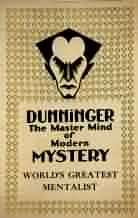

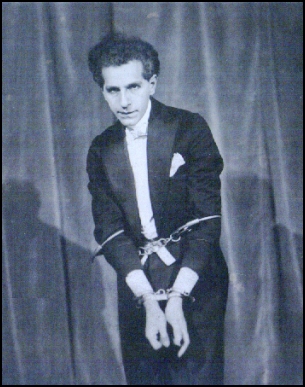 Joseph
Dunninger
Joseph
Dunninger
(1892 - 1975)
New York, NY, USA
Inducted: 2004

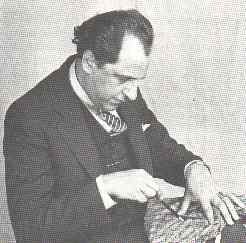 Joseph
Dunninger, the Master Mind whose mental wizardry has baffled scientists
and psychologists throughout the world, is a native New Yorker, born just
before the turn of the century and reared in the heart of the city.
Joseph
Dunninger, the Master Mind whose mental wizardry has baffled scientists
and psychologists throughout the world, is a native New Yorker, born just
before the turn of the century and reared in the heart of the city.
Apparently Dunninger's mysterious "master mind" is not a case
of heredity. His father was a successful Bavarian textile manufacturer,
and his mother performed the duties of a housewife in a purely mundane
manner. Nor did his brothers have any link with the world of magic; one
became a concert violinist and the other a painter and designer.
But in Joseph there was awakened a yearning towards magic feats even at the age of five, when he showed a marked ability at sleight-of-hand. His parents encouraged this novelty; much amused they were at the dexterity in simple palming tricks. Self-taught, Dunninger soon had a remarkable repertoire of necromancy. His childhood pastime earned him an invitation to appear before a Masonic Club at the age of seven, where he was billed as "Master Joseph Dunninger, Child Magician."
It was at this time that he caused some wonderment among his school teachers.
Master Joseph did not seem to be an extra brilliant pupil, but he invariably
got all his arithmatic problems correct. Could it be that he copied the
answers from bright children seated near him? His seating place in the
classroom was frequently changed, but still Joseph's papers were marked
100%. Dunninger explains it now: "You see, I just couldn't get the
wrong answer. I didn't have to work the problems out. The bright children
in the classroom just sent me thought waves, and consequently I got everything
right."
By the time that Dunninger was sixteen, he was an adult magician with an enviable reputation, and appeared for a year at the famous Eden Musee in 23rd Street. The boy Dunninger outmastered many of the most prominent prestidigitators of the day, and this launched him on a vaudeville tour. It was during this tour that he developed the astounding stunt of reading the minds of members of his audiences. For many years actors had presented such an illusion through the means of code messages between an assistant in the audience and the "thought reader" on stage. Dunninger used no assistants, and has never found it necessary to do so.
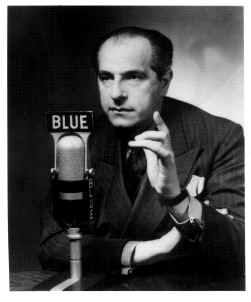 In fact, he has a standing offer of $10,000 to anyone who can prove that
he uses confederates or "stooges". Dunninger often says he could
raise that offer to $100,000. No one will ever collect it, because he
does not need assistance.
In fact, he has a standing offer of $10,000 to anyone who can prove that
he uses confederates or "stooges". Dunninger often says he could
raise that offer to $100,000. No one will ever collect it, because he
does not need assistance.
Dunninger headlined throughout the Keith-Orpheum Circuit, and was much
in demand for private entertainment. At the age of seventeen he was invited
to perform at the home of Theodore Roosevelt in Oyster Bay and at the
home of the inventor Thomas A. Edison, both of whom were avid admirers
of his mysticism. It was during this association that Dunninger developed
some of the remarkable experiments that he uses in his performance today.
His ability to read thoughts amazed the great Harry Houdini, and Howard Thurston went to great length in his search for the secret of Dunninger's mental wizardry. It was in this association that Dunninger took up his campaign of "illusion busting" waged against fraudulent mediums who have grown rich by falsification of seances that are designed to make people believe that word can come back from the spirit world. Dunninger used no assistants. In an act of inspired marketing, Dunninger offered $10,000 to anyone who could prove that he uses stooges, confederates, or assistants of any kind. Dunninger said on many occasions that he could raise the offer to $100,000, because no one would ever collect it; he didn't need assistance to read thoughts. With such an act, and such a challenge, Dunninger was soon headlining the circuit and was very much in demand for private performances.
Through the Scientific American Magazine and the Universal Council for Psychic Research Dunninger has offered $10,000 to any medium who can produce by psychic orsupernatural means any physical phenomena that he cannot reproduce by natural means or explain in convincing materialistic terms.
He has offered that amount of money to anyone who, with astra aid, can
disclose the translation of secret code messages entrusted to him by the
late Harry Houdini and Thomas A. Edison, both of whom wanted to investigate
the possibilities of communication with spirits. Dunninger has also offered
$10,000 to anyone who can introduce to him a real, house-hunting ghost.
Needless to say, Dunninger never did pay out that money.
Most of the big-time vaudeville houses in the country boasted of having Dunninger on their stages in those days. Before long his "single" became a troup of fifty, with "Dunninger, the Master Mind of Mental Mystery" presenting a full evening's entertainment which included all manner of amazing illusions. Many of the acts he created for the presence of many startling features in the repertoire of magicians now appearing before the public today. It is said that Dunninger has created more illusions than any other inventor of this type of entertainment now alive.
He has toured the world East and West, reading the thoughts of princes,
Pope Pius XII, and had been invited to the White House six times for presidential
parties at which times he read the minds of the presidents.
Time passed, and Dunninger became more and more in demand. Most of the largest vaudeville houses in the country hosted his shows. His act, with just himself performing, soon sported fifty performers, workers, and assistants. This new act, larger and more ponderous than anything he had done before, had Dunninger now presenting a full evening's entertainment which now included several varieties of illusions. It was claimed at the time that Dunninger had invented more illusions and apparatus than anyone of that day. Dunninger took the show to inspiring heights, performing all over the world. He read the thoughts of kings and princes, popes and presidents. But his fame would grow to astounding heights with the start of commercial radio.
When commercial radio started, Dunninger was the first paid entertainer to go on the air. His air debut was in a demonstration of hypnosis by radio. He was then heard in the role of a psychic detective, but neither of these features caught on. It was Daniel S. Tuthill, Vice-president and director of the Popular Division of the National Concert and Artists Corporation, who successfully evolved the Dunninger radio-formula--thought reading. The idea quickly caught the favor of Phillips Carlin, Vice-president of the Blue Network, and on September 12, 1943, Dunninger's first broadcast as Dunninger-the Master Mind was produced. Dunninger is now the sensation of the airwaves. Fan mail pours in, people clamor for tickets to the broadcast.
When television started proving itself to be a popular form of entertainment, Dunninger was there. He altered his act to fit the format of a television show. Amazingly, his series appeared on all the networks at different times. In the 1940s, a poll showed that his voice was more recognizable than that of the President's.
In addition to the radio shows and the television shows, Dunninger began appearing as a guest star on other popular shows. Because of his star-power, built on a foundation of popularity and associations with major stars of the time such as Lucille Ball and Milton Berle, he made appearances on Perry Como's radio shows and was a frequent guest on The Tonight Show with Steve Allen and Johnny Carson.
As brilliant as he was at performing, Dunninger proved a genius in marketing himself. To keep himself in the public eye, he wrote articles for magazines for both laymen and magicians. Soon the Dunninger byline was carried in such popular magazines as Time, Life, Look, Reader's Digest, Vanity Fair, Science and Invention, True Detective, and Sphinx. Every article brought letters from readers, evoking more interest, and therefore more articles. And it all paid off. His books were bestsellers in weeks. He commanded huge sums for personal appearances. He packed theaters from coat to coast. At his peak, during the 1940s and 1950s, the public could not get enough of The Master Mind.
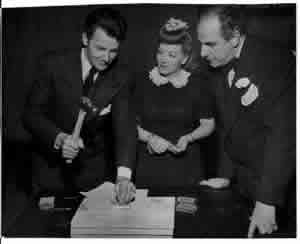
(At left: Cornel Wilde and Dolly Dawn join Dunninger in this early photo, courtesy of Joseph Atmore)
Dunninger performing style was unique to the day in that he typically sat on a stool or in a chair with nothing more than a pad of paper and a pencil. He would doodle while he called out names, initials, or numbers thought of by some member of his audience. When somebody identified the information as their own, Dunninger would spell out names, read social security numbers, or serial numbers from dollar bills. He would reveal word for word phrases merely written by a spectator. He usually concluded such a reading by asking "Are you thinking of the word 'amazing'? Is it in reference to me? Thank you very much."
It's of note that Dunninger, perhaps because of his war against fraudulent mediums, never claimed supernatural or psychic powers in his thought-reading. He never even claimed to be a mind-reader. In performance, Dunninger referred to his ability as "telesthesia", an impression received by a sense organ, but not a usual sense organ, and sometimes received from a distance. He described the process simply: "You pick up a vivid impression from another mind and others follow or suggest themselves. But it isn't mind-reading; it is thought reading. When a series of such thought impressions come in fairly close in succession, it takes on the semblance of mind reading, though if you check back, you may find that you have added links of your own making, just as you might piece together the fragments of a dream to form a waking continuity."
Dunninger was a master of his craft, possessed of a thorough knowledge of his art. When describing the necessary techniques for a successful blindfold drive, Dunninger noted, "Any competent performer should know how to size up a committee and handle them accordingly. Otherwise he shouldn't be posing as a mentalist." While the extent of Dunninger's mental capabilities were always the subject of skeptical analysis, his capability to understand human reactions was beyond question. Dunninger operated on the assumption that people have a tendency to believe almost anything if they are so inclined. He was careful in the selection of participants in his tests and he employed a sort of mental misdirection; he suggested constraints on the tests he performed that seemed to prevent deception, but in reality allowed for it. He explained why one impromptu test worked so well: "I stressed as absolute precautions the very factors that were making the result possible."
Dunninger considered mentalists halfway between magicians and mediums. "Some mentalists," he said, "rely greatly on magical methods while others attempt actual tests in ESP. However far the pendulum swings, a capable mentalist will come through with results that a dyed-in-the-wool magician could never touch, because a mentalist plays hunches and realizes how often they may come through." And a mentalist doesn't have to advertise perfect results; Dunninger himself only claimed 90% accuracy.
| The
Guide - abracaDACRI
- school - mall
- books - organizations
- contact us - hall
of fame - news
©2000 - 2009 MagicWebChannel.com |
